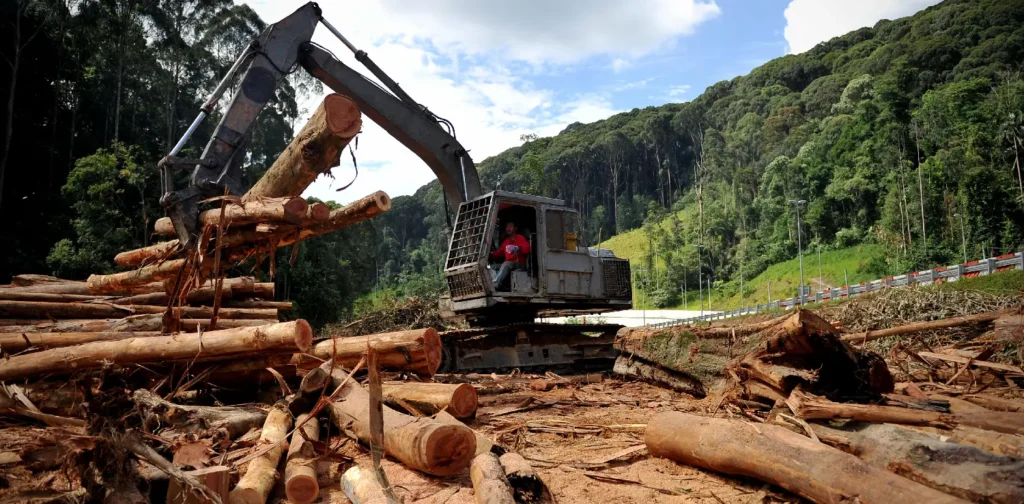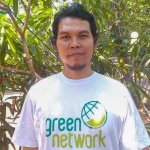The Threat of Deforestation in Indonesia Amid Growing Wood Pellet Biomass Industry

Photo: Firdaus Latif on Wikimedia Commons.
Climate change has prompted countries to shift their energy usage practices and reduce greenhouse gas emissions. However, among many available options, some are considered not entirely effective in lowering emissions. One of which is the use of wood pellets in Indonesia’s coal power plants as a co-firing material mixed with coal. In this light, a report has revealed the threat of deforestation to Indonesia’s tropical forests amid the growing wood pellet biomass industry in fulfilling co-firing biomass demands.
Biomass Co-firing in Indonesia’s Coal Power Plants
Biomass co-firing is the use of biomass as a fuel source burned alongside coal in coal power plants. The practice has recently become a growing trend in various countries, including Indonesia. It is one of the country’s key strategies to achieve the 23% renewable energy mix target by 2025, with a mandate to use 10% biomass to replace coal. Some of the most commonly used types of biomass for co-firing include wood pellets, wood chips, refuse-derived pellets, palm kernel shells, and rice husks.
In 2023, biomass co-firing was implemented in 43 coal-fired power plants across various regions in Indonesia, utilizing 1 million tons of biomass. The state-owned electricity company claimed that co-firing has reduced emissions by up to 1.05 million tons of CO2 and generated 1.04 terawatt-hours (TWh) of clean energy throughout 2023. Moving forward, the government aims to implement biomass co-firing at 52 locations or 107 units of coal-fired power plants across Indonesia by 2025.
However, a report by Earth Insight, Auriga Nusantara, Forest Watch Indonesia, Solutions for Our Climate, Trend Asia, and Mighty Earth reveals serious threats behind the expansion of the wood pellet industry, driven partly by the high demand from South Korea and Japan.
Wood Pellet Biomass and Deforestation
The report warns that using wood pellets to reduce coal combustion by 10% in large coal power plants in Indonesia could instead trigger deforestation equivalent to 35 times the land area of Jakarta, one of Indonesia’s biggest cities. Moreover, it can lead to a nearly 500 times increase in CO2 emissions than the current level.
To fulfill the demand for 10% wood pellet biomass for 107 coal-fired power plants in Indonesia by 2025, 10.23 million tons of wood pellet biomass will be needed annually, requiring 2.33 million hectares of energy plantation forests. Based on previous experience of industrial forest plantation development since the 1980s, 38% of the land was a result of deforestation.
The high demand for wood-based biomass, both domestically and internationally, adds pressure to forest areas that essentially require restoration and protection. Meeting the 10% co-firing mandate is expected to increase the deforestation rate by 2.1 million hectares annually. Gorontalo, a province known for its rich biodiversity in northern Sulawesi, is one of the wood pellet-producing regions where forests are gradually experiencing alarming deforestation.
Experts Recommendations
Aside from forests and the environment, the irresponsible expansion of the wood pellet industry will also threaten the biodiversity living within the areas. The report concludes with a compilation of recommendations from experts to prevent further harmful impacts:
- Reporting and calculating CO2 emissions from bioenergy using the same methods as used for fossil fuels.
- Excluding biomass from fuel subsidies and funding low-emission alternative activities instead.
- Including the threats from the international wood pellet trade in the assessment of species by the International Union for Conservation of Nature (IUCN) and the regulations of the Convention on International Trade in Endangered Species of Wild Fauna and Flora (CITES).
- Designating ‘restricted’ areas for industrial expansion, including for bioenergy harvesting and planting activities, covering Indigenous community lands, local community lands, and areas with endemic or endangered species, including key biodiversity areas.
- Completing high carbon stock/conservation value (HCS/HCV) assessments before plantation expansion. Enforcing corporate policies for zero deforestation, zero peat, zero exploitation (NDPE).
- Ensuring free, prior, and informed consent (FPIC).
Ultimately, all efforts in transitioning towards renewable energy use as a form of climate change mitigation must be carried out fairly and scientifically by ensuring all potential adverse impacts are addressed, whether on nature, humans, or biodiversity.
Translator: Dinda Rahmania
Editor: Kresentia Madina & Nazalea Kusuma
The original version of this article is published in Indonesian at Green Network Asia – Indonesia.

Co-create positive impact for people and the planet.
Amidst today’s increasingly complex global challenges, equipping yourself, team, and communities with interdisciplinary and cross-sectoral insights on sustainability-related issues and sustainable development is no longer optional — it is a strategic necessity to stay ahead and stay relevant.

Abul Muamar
Amar is the Manager of Indonesian Digital Publications at Green Network Asia. He holds a Master’s degree in Philosophy from Universitas Gadjah Mada and a Bachelor’s degree in Communication Studies from Universitas Sumatera Utara. He has over ten years of professional experience in journalism as a reporter and editor for several national-level media companies in Indonesia. He is also a writer, editor, and translator with a particular interest in socio-economic and environmental issues.


 Reframing Governance in the Era of Water Bankruptcy
Reframing Governance in the Era of Water Bankruptcy  Strengthening Resilience amid Growing Dependence on Space Infrastructure
Strengthening Resilience amid Growing Dependence on Space Infrastructure  Indian Gig Workers Push Back Against 10-Minute Delivery Service Strain
Indian Gig Workers Push Back Against 10-Minute Delivery Service Strain  Call for Governance: Grassroots Initiatives Look to Scale Efforts to Conserve Depleting Groundwater
Call for Governance: Grassroots Initiatives Look to Scale Efforts to Conserve Depleting Groundwater  Integrating Environment, Climate Change, and Sustainability Issues into Education Systems
Integrating Environment, Climate Change, and Sustainability Issues into Education Systems  Finally Enforced: Understanding the UN High Seas Treaty
Finally Enforced: Understanding the UN High Seas Treaty